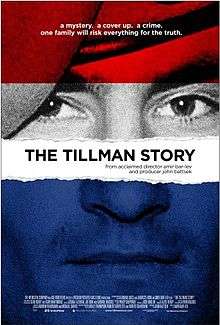The Tillman Story
| The Tillman Story | |
|---|---|
 | |
| Directed by | Amir Bar-Lev |
| Starring | Pat Tillman |
| Narrated by | Josh Brolin |
| Distributed by | Passion Pictures |
Release dates |
|
Running time | 94 minutes |
| Country | United States |
| Language | English |
| Box office | $798,940[1] |
The Tillman Story is a 2010 American documentary film directed by Amir Bar-Lev. The film is about the death of football player turned U.S. Army Ranger, Pat Tillman, in the war in Afghanistan, the coverup of the true circumstances of his death, and his family's struggle to unearth the truth. It was nominated for the Grand Jury Prize at the 2010 Sundance Film Festival. It was named 2010 Best Documentary by the San Francisco Film Critics Circle,[2] the St. Louis Gateway Film Critics Association, and the Florida Film Critics Circle.[3] The film is narrated by Josh Brolin.[4]
Pat Tillman was a defensive back with the Arizona Cardinals, but decided to walk away from a multimillion-dollar contract to go to Afghanistan in 2002. After Tillman was killed, an investigation showed that he died by friendly fire. Tillman's family says they learned weeks later that the inspiring story the military had publicized was false. The film shows a paper trail — including a leaked top-secret document known as a P4 Memo, sent to the White House by Gen. Stanley McChrystal.[5] Bar-Lev follows Pat’s mother, Mary (also known as "Dannie"), as she goes through 3,000 pages of redacted documents trying to uncover the facts.[6]
Bar-Lev began work on the documentary in 2007 during the congressional hearings on the incident. He asked the family for their cooperation for seven months until they agreed to participate.[7]
Reception
The film currently has a 93% fresh rating on Rotten Tomatoes based on 82 reviews.[8]
Ann Hornaday in The Washington Post gave the documentary three and a half out of four stars, calling it "masterful" and "unsettling."[9] Rolling Stone's Peter Travers wrote: "This documentary succeeds triumphantly on so many levels that its full impact doesn't hit you until you have time to register its aftershocks...it will get under your skin."[10] Owen Gleiberman of Entertainment Weekly graded the film a "B+", saying it is "morally incisive."[11]
References
- ↑ The Tillman Story - The Numbers
- ↑ http://sffcc.org/category/awards/page/3/
- ↑ http://variety.com/2010/film/awards/florida-film-critics-laud-inception-social-network-1118029307/
- ↑ Josh Brolin Scores Touchdown with 'The Tillman Story' Narration on accessAtlanta
- ↑ Mondello, Bob (2010-09-07). "'The Tillman Story': One Family's Quest For The Truth". NPR (electronic ed.).
- ↑ http://www.boston.com/ae/movies/articles/2010/09/03/in_search_of_the_real_pat_tillman/
- ↑ http://www.pbs.org/newshour/art/conversation-amir-bar-lev-tells-the-tillman-story/
- ↑ Rotten Tomatoes
- ↑ Hornaday, Ann (2010-09-03). "'The Tillman Story' tackles story of soldier lost to far more than friendly fire". Washington Post (electronic ed.).
- ↑ Travers, Peter (2010-08-18). "The Tillman Story". Rolling Stone (electronic ed.).
- ↑ Gleiberman, Owen (2010-08-26). "The Tillman Story: A behind-the-curtain look at the propaganda machine". Entertainment Weekly (electronic ed.).
External links
- Official website
- The Tillman Story at the Internet Movie Database
- The Tillman Story (Review) on CorrienteLatina
- IONCINEMA.com interview with Amir Bar-Lev for The Tillman Story
- Holden, Stephen (2010-08-19). "When heroism means finding truth". New York Times (electronic ed.).